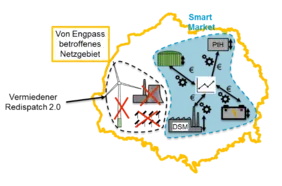The Energy Systems Engineering research group of the Institute of New Energy Systems (InES) at Technische Hochschule Ingolstadt (THI), together with the project partner Stadtwerke Rosenheim (SWRO), organised an online workshop on 13.12.2021 to present the final results of the project SmartBio, which was funded by the Agency for Renewable Resources (Fachagentur Nachwachsende Rohstoffe e.V.). to about 30 participants from research and industry.
Renewable electricity from biogas plants has relatively high production costs compared to other renewable generation technologies. In contrast to the volatile electricity production with wind power and PV plants, flexible biogas plants can adjust their electricity production in a targeted manner and react to price signals from different markets. Biogas plants can use their flexibility to counteract a possible decrease in subsidy intensity through the EEG or KWKG after the 20-year operating period. The SmartBio project is investigating what additional revenues biogas plants could realise by participating in a market-based congestion management regime. The prerequisite for this is the addition of a market-based element (smart market approach) to the current purely cost-based congestion management in Germany. Congestion management according to the smart market approach enables a cost reduction of congestion management through the integration of previously unused flexibility potentials, through the competitive pressure prevailing in market-based grid congestion management and through the innovation mobilised by additional revenue potentials. Biogas plants can contribute to this and thus generate additional revenues. These additional revenues were quantified in the research project for various flexible biogas plant concepts and representative congestion situations in northern and southern Germany in 2025.
The SmartBio project showed that flexible biogas plants can be an important component of market-based congestion management. According to the research results, biogas plants make a major contribution to solving congestion problems, both in terms of "reducing the net power output" before the congestion and "increasing the net power output" after the congestion, thus reducing the costs of congestion management and avoiding the need for curtailment. The availability of biogas plants strongly depends on the plant concept (power quotient and gas storage size) in interaction with the congestion characteristics. For example, biogas plants with a high power quotient are often not available for lowering production during short bottlenecks at midday (as in Bavaria in particular) - but they also do not contribute to these bottleneck situations. In the case of longer congestion situations in Schleswig-Holstein or in Bavaria (e.g. signal "increase net power output"), congestion management via the smart market is possible for all modelled system concepts. As there are often significant capacities regionally, large amounts of energy can be used for congestion management by biogas with low CO2 emissions if market participation is successful. Biogas plants have particularly good chances of earning additional revenue on the Smart Market through low bids for the "reduce net power output" signal. Under the assumptions of SmartBio, the specific revenue potentials on the Smart Market range between 22 and 76 €/MWh, which in the scenario year 2025 - depending on the activity on the Smart Market - can mean an annual increase in electricity revenues between ca. 0 and ca. 40 %. Since the bids of the biogas plants are close to the upper cost limit for the signal "Increase net power output", the potential for additional revenues is much lower. The specific additional revenues here are between ca. 0 and 23 €/MWh, which results in an annual increase in electricity revenues of less than 3 % in the scenario year 2025. Flexible biogas plants can thus contribute to efficient congestion management in a congestion management regime according to the smart market approach and generate additional revenues. For Prof. Dr-Ing. Holzhammer, there is therefore no question that the untapped potential of biogas plants to contribute cost-effectively to congestion management should be used and that biogas plants continue to play an important role as a renewable source on the way to an almost CO2-free energy supply. This final summary concluded the successful final workshop.
The brochure produced as part of the project summarises the central assumptions and results in SmartBio and is available for download here. A detailed report on the research project will be published in Q2 2022.
A presentation by SWRO (Gilbert Vogler) on experiences and challenges in implementing Redispatch 2.0, which also plays an important role in the Smart Market approach, rounded off the workshop and was the starting point for a lively exchange between the project team and the participants.
The SmartBio research project was funded by the Agency for Renewable Resources (Fachagentur Nachwachsende Rohstoffe e.V.). with funds from the Federal Ministry of Food and Agriculture (BMEL) and was based at the THI's research branch in Neuburg an der Donau in the field of energy systems technology.


![[Translate to English:] Logo Akkreditierungsrat: Systemakkreditiert](/fileadmin/_processed_/2/8/csm_AR-Siegel_Systemakkreditierung_bc4ea3377d.webp)








![[Translate to English:] Logo IHK Ausbildungsbetrieb 2023](/fileadmin/_processed_/6/0/csm_IHK_Ausbildungsbetrieb_digital_2023_6850f47537.webp)


